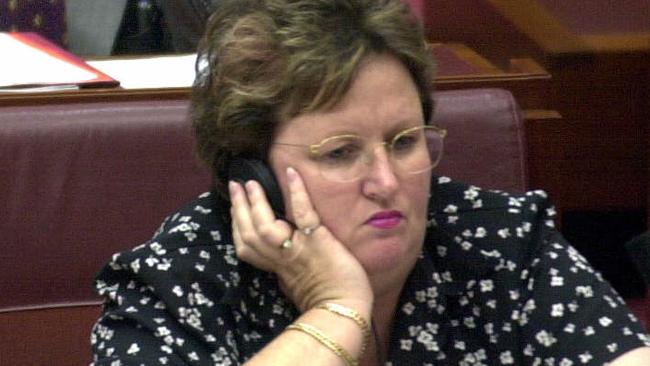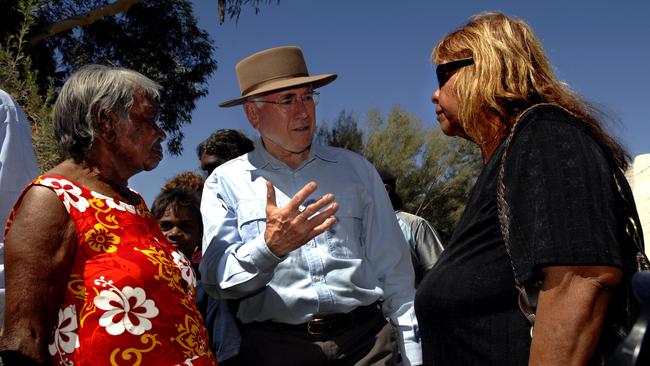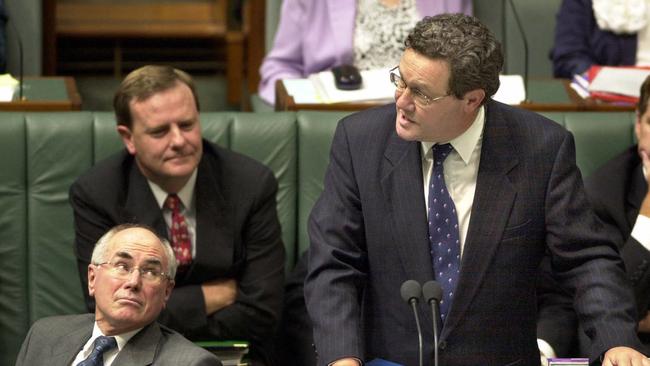Cabinet Papers 2002: Howard government sought to restrain growth of Disability Support Pension
Concerns over ‘inappropriate access’ to the Disability Support Pension prompted Howard government to introduce measures to reduce number of recipients, cabinet papers from 2002 reveal.

The Howard government desperately sought to “restrain the growth” of those on the Disability Support Pension in 2002 with a raft of measures aimed at slashing the number of those on the scheme by a quarter, including by instructing medical assessors to “be more rigorous” in their examination of whether a person’s condition was permanent.
Cabinet papers from 2002 released by the National Archives revealed concerns from the government over the “inappropriate access” to the DSP by those who had the capacity to work and the “unaffordability” of the ballooning scheme, which had doubled over the previous decade.
“This is a major pressure point in the welfare budget,” a submission to cabinet in February 2002 by family and community services Minister Amanda Vanstone and employment Minister Tony Abbott read.
CABINET PAPERS 2002

‘Advantage lost’: Costello slams inaction on debt
Twenty years after warning cabinet of significant future budget pressures, former Treasurer Peter Costello says the fiscal and debt position of the nation is far worse than it needed to be.

‘I don’t have time for egomaniacs who take notes’
Amanda Vanstone lifts the lid on her time in cabinet, including her dealings with John Howard and disdain for ministers more concerned with publishing memoirs than serving the community.

Why Howard government refused to say sorry
Fears that present day Australians would be held responsible for atrocities of the past were behind the Howard government’s refusal to apologise to Indigenous Australians in 2002.

Hicks’ Guantanamo detention ‘lawful’, government ruled
Australian and US governments agreed on the need for a ‘consistent public position’ on Guantanamo detainee David Hicks, cabinet minutes from February 2002 reveal.

‘Why we never ratified Kyoto was beyond me’: Costello
Peter Costello laments rejection of 1997 Kyoto Protocol as cabinet documents from 2002 reveal Treasury argued for incentives to invest in cleaner energy.

Howard warns on ‘reform fatigue’
John Howard and Peter Costello urge major parties to prioritise deficit and debt reduction to protect the nation from the next major economic shock.

How Kyoto rejection kickstarted the climate wars
Concerns the Kyoto protocol would ‘risk Australia’s competitive advantage in emissions-intensive activities’ were one reason behind Howard government’s refusal to ratify the agreement.

Frustration over new security laws post-9/11
The Department of Prime Minister and Cabinet feared its inability to get state agreement on contentious new security measures in the wake of September 11.

How 9/11, Bali bombings changed our military
With the threat of terrorism looming large, the Howard government created a national special forces command to ensure ‘surgical’ military responses.

Release of Bali bombmaker ‘regrettable’
Former PM sympathises with victims and relatives over early release from jail of Bali bombmaker Umar Patek.

Australia wary of Afghanistan troop commitment
Declassified national security committee documents reveal that in June of 2002, Defence argued it was ‘not in a position to contribute’ to UN force in Afghanistan.

Christmas Island detention centre’s fast-tracking revealed
The Howard government fast-tracked plans to build the first ‘purpose-designed and built’ offshore detention centre controlled by Australia in 2002.

Timor Sea Treaty negotiations to be kept under wraps
Disclosure of details on joint resource-sharing agreement between East Timor and Australia would “damage security”, National Archives rules.

Push to restrain growth of disability pension
Concerns over ‘inappropriate access’ to the Disability Support Pension prompted Howard government to introduce measures to reduce number of recipients, cabinet papers from 2002 reveal.
“More robust assessment of the existing work capacity for DSP (will) be introduced from September 2002. This is expected to reduce inflows to DSP by around 4,000, or 6 per cent, a year.”
Senior ministers asked Senator Vanstone to bring forward measures to make “improvements to medical and work capacity assessments”, the cabinet papers revealed.
“These options include tighter administration by Centrelink in assessing whether a person has the capacity to benefit from mainstream training and waiting for medical conditions to stabilise before deciding to grant DSP,” Senator Vanstone and Mr Abbot said in a submission to cabinet.
The submission also recommended the threshold for “capacity to work” be lowered before someone got access to the DSP from 30 hours a week to just 15, meaning if a person could work even just two days a week they would not receive the payment.
“Current Labor market realities, such as the widespread availability of part time work, indicate the benchmark of 30 is set too high,” it said.
“Lowering the benchmark to 15 hours a week would reduce inflows to the DSP by around 5,400 a year, or 7 per cent.”
Senator Vanstone and Mr Abbott told cabinet it would be “clearly reasonable” for available rehabilitation and similar supports to be considered in determining whether a person with a disability would be able to work in the short term.
“Legislation would be needed to permit this but, by itself, this change would reduce inflows to DSP by nearly 30 per cent, or 23,000 (people) a year,” their submission read.
“Such a change would clearly be reasonable and likely to have broad support, particularly if accompanied by measures to ensure that rehabilitation assistance is available and taken up by those who could benefit.”
The reforms aimed to curb the growth of those on the scheme from the 640,000 people to the predicted rise to 870,000 by 2010.
“Outlays on the DSP are already in excess of $6 billion a year and expected to be over $8 billion in the forward estimates period unless substantial policy changes are implemented soon,” Senator Vanstone told cabinet in a submission in March.
Two decades later, just over 750,000 people are accessing the DSP.
Senator Vanstone estimated it would take eight years to review all those on the DSP under the new criteria and that a quarter would have their pensions cancelled as a result.
“Most would qualify for the Newstart Allowance or other payments and receive a lower rate of payment than currently received,” she told cabinet.
“Around 6,200 new applicants for the DSP per year will not be granted the DSP under this change.”
The Department of Health noted in response to Senator Vanstone’s cabinet submission that people moving off the DSP would face a decrease in health care requirements, such as those with hearing difficulties who would no longer have access to government-funded or subsidised hearing services.
Senator Vanstone said the savings from the measures would offset renewed growth funding for the third Commonwealth State Disability Agreement, which was being negotiated that year.
In separate cabinet documents, she expressed frustration with the states over their role in providing disability services under the agreement.
“I made it clear to state and territory ministers that there are limits to ongoing funding by the Commonwealth of what are basically state and territory responsibilities,” she said.
“I provided figures which demonstrated that most of the states and territories were significantly behind the Commonwealth in funding growth … State and territory ministers were clearly not expecting that their funding performance would be openly analysed.”
The battle between states and territories and the federal government over provision of disability support remains to this day, though it is now over the funding of the National Disability Insurance Scheme, which was brought into place in 2013.
NDIS Minister Bill Shorten has made clear that the 50/50 funding arrangement with states and territories has slipped and left the federal government funding close to 70 per cent of the scheme.
Changes to the DSP and disability services came as the government looked to broader reforms of the welfare system in response to the McClure Report in 2000, which recommended simplifying social security payments and introducing a common base rate payment with extra funding added on depending on a person’s circumstance.
As part of its response to the report, the government announced it would axe payments including the parenting payment, widow allowance and the wife pension.




To join the conversation, please log in. Don't have an account? Register
Join the conversation, you are commenting as Logout